Channel 4’s latest reality TV production, Virgin Island, has been slammed by viewers after debuting last Monday (May 12). Some have branded the show as “absolutely excruciating” and a “new low” for British television.
The six-part series follows 12 adults, aged between 22 and 30, who have never had intimate relations. Set at a retreat in Croatia, the show challenges them to confront their fears around intimacy through a variety of tasks—many of them raunchy and deeply personal—all in a bid to lose their virginity.
- Channel 4’s reality show ‘Virgin Island’ features 12 singles facing raunchy challenges to lose their virginity.
- The show uses ‘surrogate partner therapy’ under sexologists to help contestants overcome intimacy fears.
- Sexologists argue the show offers authentic depictions of intimacy, but viewers slammed it as “exploitative.”
“It feels wrong to be watching this,” one user wrote on X. “This is so exploitative. I can’t even imagine being one of them right now.”
New British reality show Virgin Island was labeled a “new low” by viewers after its debut last Monday
Image credits: Channel 4
As Bored Pandapreviously reported, the show involves the guidance of sexologists and the use of “surrogate partner therapy,” a controversial treatment in which a person acts as an intimate partner to the patient, employing a range of therapeutic experiences of various levels of intensity, from relaxation to intimate contact.
Image credits: Channel 4
The opening episode introduced viewers to participants like 29-year-old receptionist Taylor, who broke down in tears during an eye contact exercise with another contestant, and 28-year-old Zac, who jumped at the chance of having intimacy with his assigned surrogate during their first session.
Image credits: Channel 4
Anticipating the backlash, Channel 4 has insisted that the show ultimately aims to create a supportive and therapeutic environment—a claim that was thoroughly rejected by viewers.
“When you couldn’t think TV would get any lower, then pops along Virgin Island,” one user wrote. “That was excruciating to watch.”
The show aims to provide viewers with a more realistic and healthy depiction of what intimacy looks like
Image credits: www.youtube.com
At the heart of Virgin Island is the work of sexologists Dr. Danielle Harel and Celeste Hirschman, co-founders of the Somatica Institute.
Both professionals defend the show’s concept, arguing that mainstream depictions of s*x are far more damaging than what Virgin Island could ever portray.
Image credits: Channel 4
“The quality of s*x on television is abysmal,” Hirschman said. “It’s like three kisses up against the wall, pulling off the pants, sticking it in, and then it’s over.”
For the sexologists, the show serves as a chance to portray “realistic and connected” intimate experiences on television, framing the production as a much-needed paradigm shift.
“If they portrayed s*x that was more authentic and at a pace people actually experience, it might be a boon to have that much s*x on television,” Hirschman continued.
Image credits: Channel 4
Touching on the controversy surrounding the usage of surrogate partner therapy, a process critics argue should not be filmed for entertainment purposes, Hirschman stated that it is an essential part of the show, as it goes hand-in-hand with their goal of showing authentic relationships.
“That authenticity is what actually prepares people to have real relationships out in the world,” she explained. “It’s not just trying to force something.”
The show comes at a moment when virginity among young adults is at an all-time high, as per study
Image credits: Channel 4
The controversial therapy involves a client, a surrogate, and a therapist. The therapist is there to ensure boundaries are respected, and emotional developments are handled professionally, especially if the client ends up developing real feelings towards their “partner.”
“If feelings become developed, the therapist is available to talk the client through whatever feelings they have around it,” Hirschman added.
Dr. Harel then followed by assuring the public that the show’s participants never misunderstood the nature of their sessions. “They felt like, ‘Okay, this is a therapeutic modality that’s going to help me grow,’ and that’s how it was set up for them.”
Despite the controversy surrounding it, the show comes at a time where young adult virginity seems to be on the rise. For instance, a University College London study cited in the show reveals that one in eight 26-year-olds remain virgins, up from one in 20 in previous generations.
The study mainly blames social media and the ease of access to explicit content online for creating a fear of intimacy among young people.
As Susanna Abse, a psychotherapist at Balint Consultancy, puts it: “Millennials have been brought up in a culture of hypers*xuality which has bred a fear of intimacy.”
“Predatory.” Despite the show’s intentions, viewers felt perturbed by what they saw
Image credits: V0ice_OfReason7
Image credits: _N47H4N
Image credits: mindsetSeek
Image credits: lenasloyalty
Image credits: vborovikov
Image credits: PretendDawn
Image credits: Snowgard_
Image credits: MayoMonkey515
Image credits: randomname6956
Image credits: Majewra
Image credits: downlowfarming
Image credits: yosoymario91
Thanks! Check out the results:


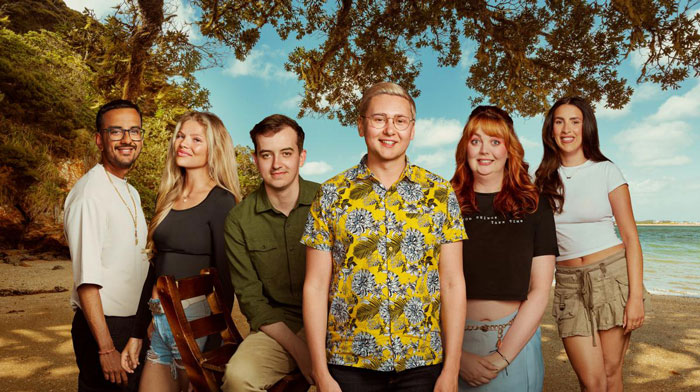
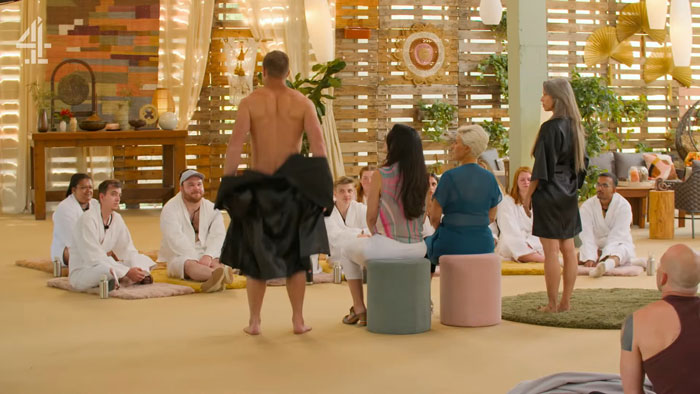
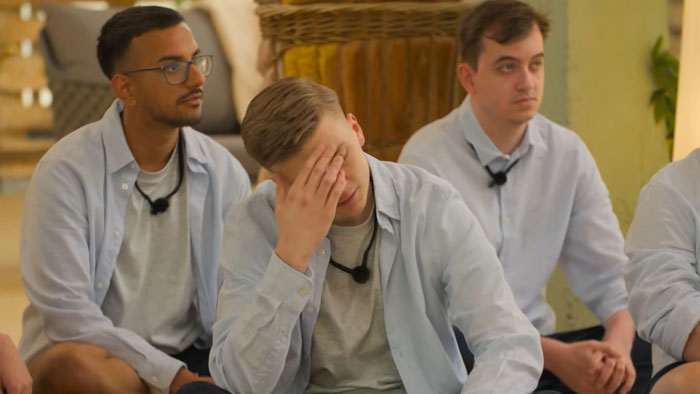
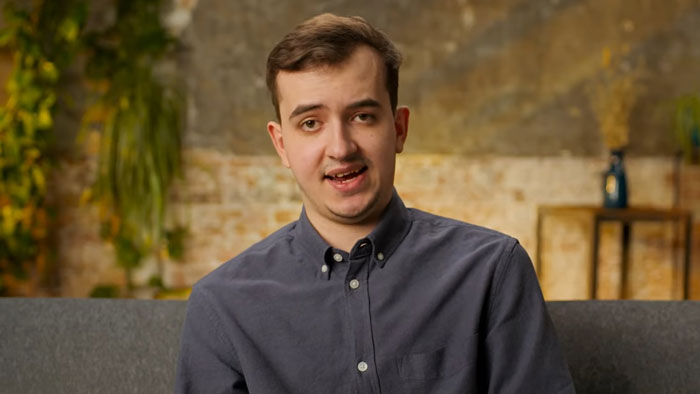
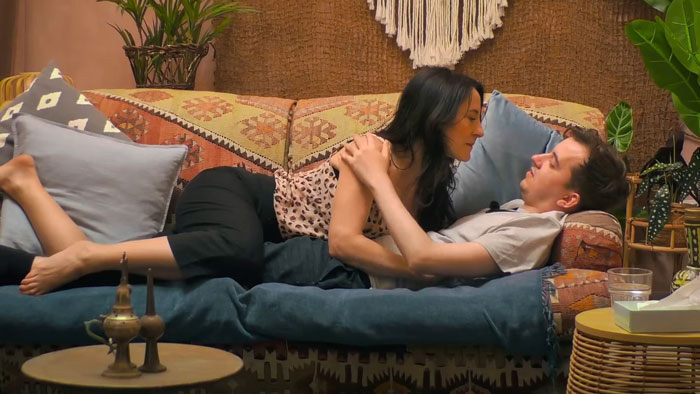
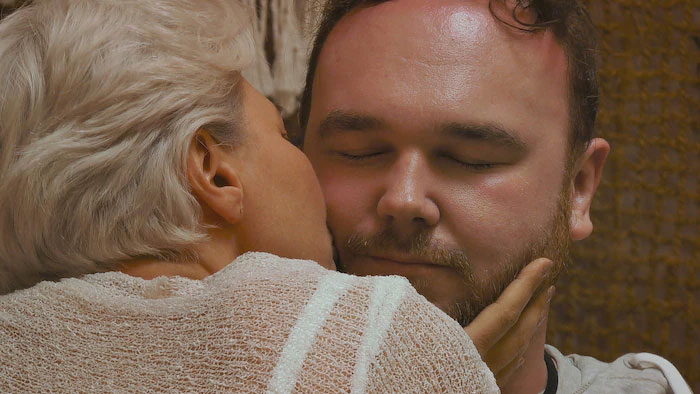
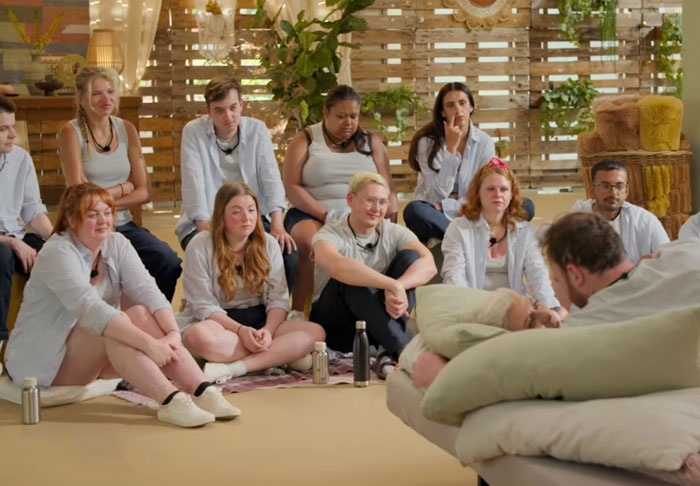
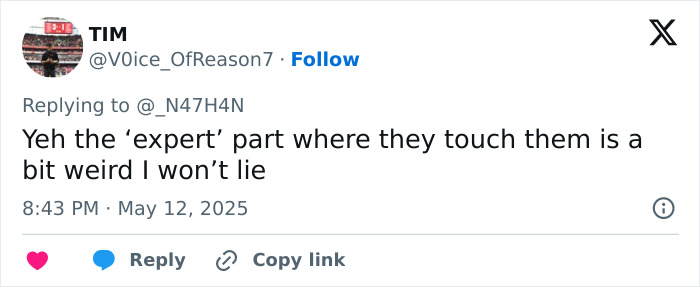
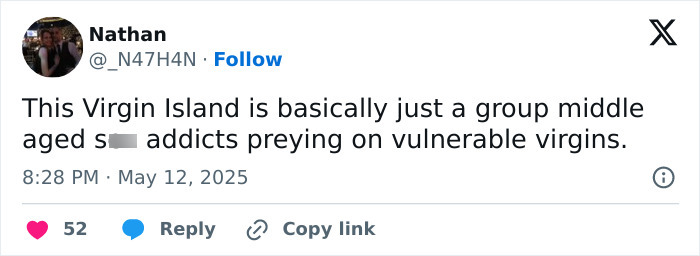



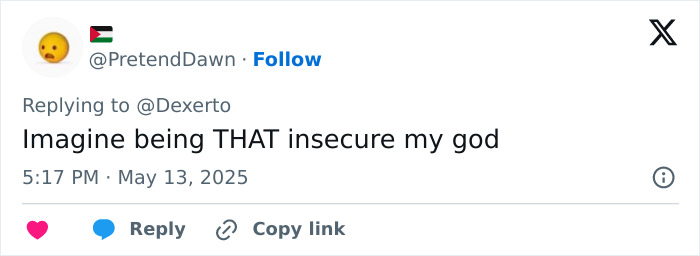

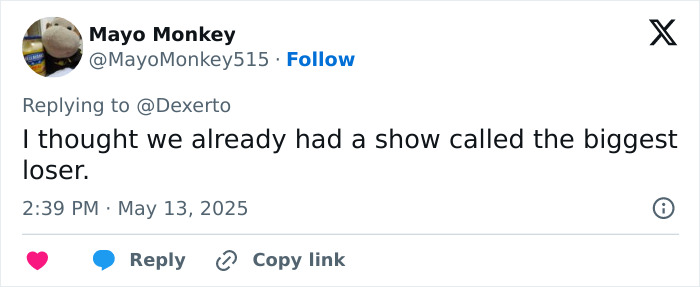
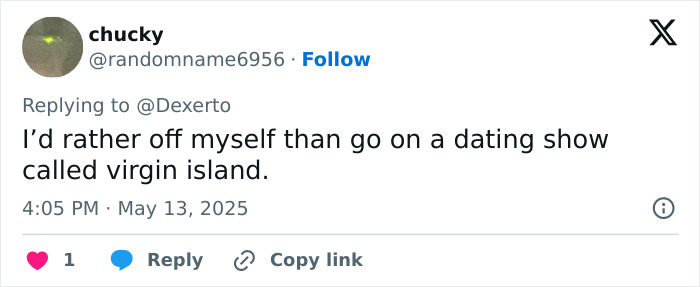


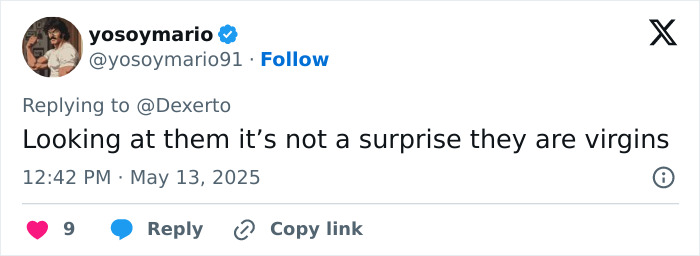
0 Comments